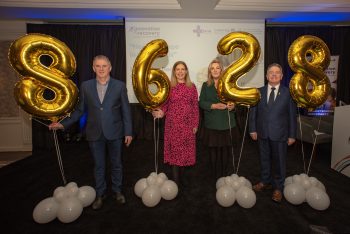March 12, 2023

‘Health and Hope in your Hands’ – Over 8,000 people benefited from the Innovation Recovery Project
Link to highlights video:
Over 8,000 people across Ireland and Northern Ireland including those with lived experience, carers, and health professionals have benefited from the services offered as part of the European Union’s INTERREG VA Programme, the Innovation Recovery Project.
Since Covid-19, there has been a radical shift from the medical model of treatment of mental health difficulties to a social, educational and collaborative approach. The Innovation Recovery Project has led the way for this new approach through its cross-border mental health education initiative, providing an opportunity to extend mental health recovery education along the entire Irish border region through a wide range of free, local educational courses to promote mental health, well-being and recovery.
The project was developed through funding from the European Union’s INTERREG VA Programme (€7.6m) and managed by Cooperation and Working Together (CAWT) on behalf of the Special EU Programmes Body (SEUPB). It was delivered in the border counties of Ireland and across Northern Ireland along with support from key partners including HSE, Public Health Agency, Strategic Planning and Performance Group, Southern Health and Social Care Trust, Western Health and Social Care Trust and Belfast Health and Social Care Trust.
An evaluation of the project has determined it successfully developed a Recovery College infrastructure in tandem with a range of community and voluntary sector partners. The Covid-19 pandemic prompted its services to be adapted with a switch to free, online and interactive learning. This flexible learning experience offered a range of support, training and practical tools to promote hope, optimism and recovery, all of which was critical during Covid-19. It also increased scale of project delivery, enabling the services to be delivered across Northern Ireland and the border counties of the Republic of Ireland.
Reflecting on the importance of the project, Peter May, Permanent Secretary, for the Department of Health in Northern Ireland said: “Those who participated in the Innovation Recovery Project, a first of its kind on a cross border basis, should be very proud of what they have achieved. The innovative approach of learning online and service user engagement will encourage people to communicate and get involved more directly. I know it will inspire work in other areas and contexts as we work together to address the common mental health challenges both North and South. This project will also serve to enhance and complement a number of key strategic objectives currently being delivered by the Department of Health and its key partners including the ten-year Mental Health Strategy which I know was a key focus for all Executive Ministers.”
Mary Butler, Irish Minister for Health said: “The Irish Government’s commitment to enhancing mental health supports is demonstrated by the significant increase in funding for mental health services in recent years.
The establishment of three cross border community-based recovery college hubs and the development of the Online Recovery College have real value in empowering people and communities to increase knowledge and skills for recovery and self-management of mental health.
I truly believe that continued collaboration is essential if we are to successfully reduce the burden of mental health challenges and improve everyone’s wellbeing on the island.”
Gina McIntyre, Chief Executive of the SEUPB, said: “Health and social care services, including mental health services, face more challenges today than ever before, on both sides of the border. The distance of a few miles can have a significant impact on the services available to citizens and therefore their life opportunities.
This EU INTERREG VA-Programme provides funding to encourage cross border collaborative projects which take advantage of economies of scale and benefit our citizens living in a border region. This funded project has not only brought together professionals to support mental health recovery, but also established the peer educator volunteers who have provided their own lived experience to thousands of people across the Programme area.
The funding has enabled people to take control of their mental health recovery, and it is amazing to see and hear about the positive difference this project has made in improving lives.”
John Meehan, Project Chair of the CAWT Partnership, said: “We are proud to have managed the Innovation Recovery Project on behalf of SEUPB and it is inspiring to see how it has improved access to mental health prevention and support initiatives, as well as developing strong cross-border relationships to support reforms currently underway within the two jurisdictions.
The project aimed to assist people who have experienced mental health issues to self-manage their own recovery. The approach sought to establish a virtual recovery college as a social rather than clinical model and combined the knowledge of mental health service users with the clinical skills of mental health practitioners. At the heart of the recovery college approach was that participants engage with and learn alongside those who have experienced similar mental health issues.
The project was extremely successful in providing the tools peer educators and service users needed to improve their well-being and recovery particularly as we navigated through the Covid-19 pandemic. We are thankful to SEUPB and the government departments for their support and insight throughout.”
The project successfully met its targets in terms of beneficiaries, co-production and scale of the training offered, with over 850 staff trained in a range of bespoke programmes focusing on the promotion of self-help techniques such as goal setting, problem solving and peer support.
The free training is still available via the online platform at mymentalhealthrecovery.com.
ENDS



